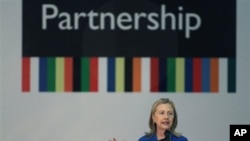The United States and Brazil recently co-hosted the first high-level conference of the Open Government Partnership in Brasilia, Brazil. Fifty-five countries are now participating in the initiative, encompassing a quarter of the world’s people. In consultation with civil society, each government has outlined concrete steps that it will take to open its doors so citizens are empowered, problems are solved, and democracy is strengthened.
At its inception last fall, President Barack Obama made clear that the purpose of the Open Government Partnership is to advance specific initiatives to promote transparency, fight corruption, and energize civic engagement, all through a unique collaboration between governments and civil society. The United States is convinced that countries with open governments, open economies, and open societies will increasingly flourish.
Conversely, governments that hide from public view and dismiss the idea of openness and the aspirations of their people for greater freedom will find it more difficult to maintain peace and security. Countries that attempt to monopolize economic activity, will find it increasingly hard to prosper. And those societies that believe they can be closed to ideas, cultures, and beliefs different from theirs, will find that in the age of the Internet they will be left behind.
The countries that have joined the Open Government Partnership must do more than make promises; they must deliver on their commitments. Many are already doing so. Chile, Estonia, Israel, Italy, Jordan, Peru, Romania, Spain and Tanzania, for example, are all creating websites to make public data available to citizens on everything from crime statistics to political party financing to local budgets.
For its part, the United States is committed to 26 initiatives designed to increase public integrity, promote public participation, improve public services, and do a better job of managing public resources.
New technologies such as the Internet have provided innovative tools to keep governments accountable. Now enormous quantities of public data can be made easily available on line.
The United States, said Secretary Clinton, intends to do all it can to help make the Open Government Partnership a leader in ensuring that the 21st century is an era of openness, transparency, accountability, freedom, democracy, and results for people everywhere.
Open Government Partnership

Fifty-five countries are now participating in the initiative, encompassing a quarter of the world’s people.



